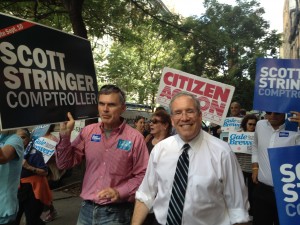The Rise of Scott Stringer, the Fall of Eliot Spitzer
(This article appeared in the Bronx News, 9/26/2013 – 10/2/2013, under “Views on the News”)
by: Susan Gluss
The race for New York City comptroller was supposed to be Eliot Spitzer’s comeback. But in an era when money fuels politics, an old-fashioned campaign of volunteers and small donations stopped him cold.
Spitzer’s opponent Scott Stringer had been running unopposed and was considered a shoo-in. Boasting a 20-year legacy of public service, the borough president and former assemblyman had broad support among Manhattan democrats.
Disgraced former Governor Eliot Spitzer surprised Stringer—and the nation—by announcing his own candidacy in early July—just four days before the filing deadline.
The political shock wave spread quickly. How could the former Gov and one-time Attorney General get enough signatures in time for a spot on the September primary ballot? Rumor had it that he paid volunteers up to $800 per day to canvass the city.
The plan was to blindside Stringer, some pundits said, and catch him unprepared, without a campaign organization or money to survive a surprise attack.
Spitzer, a one-time champion of public financing, abandoned that policy and bankrolled his own campaign. And what a boatload of cash! He spent about ten million, outspending Stringer nearly two to one.
Spitzer threw money around like confetti at a ball game, saturating the airwaves with TV and radio ads; financing a slew of consultants; hiring former Obama strategists.
But Stringer scrambled, hiring campaign staff, pollsters, and media pros to fend off a man once described as a “rocket powered by ambition and hubris.”
It was brutal. Scott (this writer’s cousin) campaigned from six a.m. to midnight, nearly every day. His wife Elyse, just starting a new job, joined him on the campaign trail, while caring for their 14-week old baby and two-year old. Stringer’s parents canceled their vacation and joined the fray.
Eliot Spitzer campaigned without his estranged wife. But he led early, due largely to name recognition and choice guest spots on national late-night talk shows. A stunning 19-point lead according to the first polls. He was invincible. Or so he thought.
The hot-button issues emerged quickly. Scott hammered Eliot on his scandal-ridden past: the hooker revelations that forced him out of office. He accused him of enforcing one rule of law for criminals – while holding himself to a different standard. The one-time presidential aspirant squirmed.
Spitzer tried to capitalize on voters’ anger over billionaire Mayor Michael Bloomberg’s third term, by accusing Stringer of cutting some back room legislative deal—a charge a prominent newspaper called “misleading” at best.
Spitzer is known as a hot-tempered bully. At least one news report said Governor Cuomo was afraid to endorse Stringer publicly for fear of retribution if Spitzer won. But he twisted arms behind the scenes, campaign insiders said.
In late August, the polls began to shift. The gap tightened to just a few points. It became “the race to watch,” said Stringer’s mother, Arlene Cuevas, herself a former elected official. “Would voters choose Spitzer and defeat an honest politician,” she wondered?
It was a nail-biter.
But on election eve, Stringer kept a steady lead by about 52 to 48%. When the former Gov called to concede, Scott’s supporters erupted in cheers. Spitzer had dropped a double-digit lead in just two months. The odyssey had finally ended.
“I believe that public service can make a difference. I’ve believed that ever since I was a little kid,” Stringer told a cheering crowd of supporters during his acceptance speech. “We built a coalition. We had labor. We had parents. We had the next generation of democrats. We had every progressive reform organization in the city – and that matters.”
Democrat Scott Stringer faces Republican John Burnett in the Nov. 5 general election.

